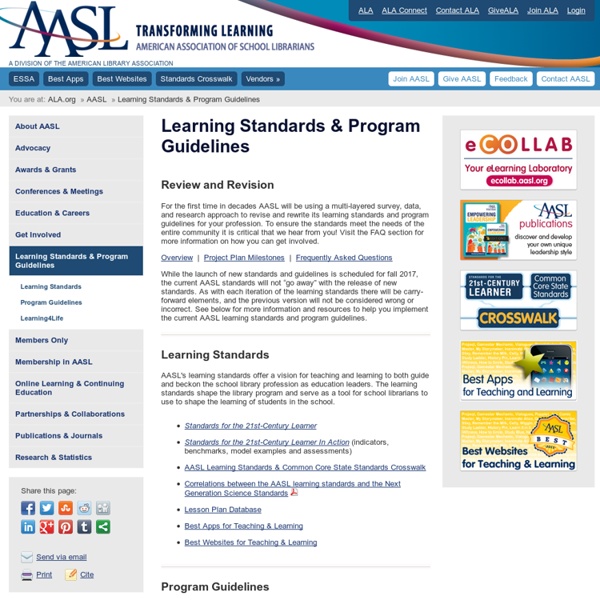Learning Standards & Program Guidelines
Review and Revision For the first time in decades AASL will be using a multi-layered survey, data, and research approach to revise and rewrite its learning standards and program guidelines for your profession. To ensure the standards meet the needs of the entire community it is critical that we hear from you! Visit the FAQ section for more information on how you can get involved. Overview | Project Plan Milestones | Frequently Asked Questions While the launch of new standards and guidelines is scheduled for fall 2017, the current AASL standards will not “go away” with the release of new standards. Learning Standards AASL's learning standards offer a vision for teaching and learning to both guide and beckon the school library profession as education leaders. Program Guidelines AASL's newest set of program guidelines defines the future direction of school library programs. Learning4Life
Framework for 21st Century Curriculum and Assessment
Updated February 2013 Adopted by the NCTE Executive Committee November 19, 2008 Context for NCTE’s 21st Century Literacies Framework In the 1990s, the National Council of Teachers of English and the International Reading Association established national standards for English language arts learners that anticipated the more sophisticated literacy skills and abilities required for full participation in a global, 21st century community. The selected standards, listed in the appendix, served as a clarion call for changes underway today in literacy education. The NCTE definition of 21st century literacies makes it clear that the continued evolution of curriculum, assessment, and teaching practice itself is necessary: Literacy has always been a collection of cultural and communicative practices shared among members of particular groups. Elements of the Framework Implications of the Framework for Assessments Appendix: 1. 2. 3. 6. 7. 8. 10. 12.
Home | International Literacy Association
Illinois School Library Media Association
K-12 Technology News -- THE Journal
Report: Collection of Ed Data Useful but Challenging The burgeoning collection of data in education poses "infrastructure challenges" related to creation and storage that reduce the usefulness of data and presents "data privacy implications" that haven't been resolved, even with the current crop of regulations. By Dian Schaffhauser11/05/18 Detailed Picture of 'Inequality of Opportunity' Emerges Where kids grow up has a big impact on how well they'll do as adults. While that may sound obvious, a new program that brings together economists from Harvard University and Brown University and researchers from the U.S.
K-12
2 Resources Ed Tech Leaders Can Use to Plan for Emerging Tech, Trends and Challenges The 2016 K-12 Horizon Report and toolkit provide an opportunity for communities to strategically plan for the future. Howard County, Md. Continues to Phase in Laptops From Youngest to Oldest Students The county is leasing laptops in a multi-year initiative designed to give every student a device to use at school. Winning School Idea Would Serve Homeless, Foster Youth Laurene Powell Jobs funded a high school redesign competition whose winner plans to combine physical spaces, a bus-based resource center and online learning. Oklahoma Plans Statewide Broadband Initiative for Schools The state is working with EducationSuperHighway to assess high-speed Internet requirements in schools and increase connectivity accordingly. ConnectED Day Continues Conversation About High-Speed Broadband for Students Teacher-Created Digital Lessons Will Replace Some Textbooks in an Illinois School District
Related:
Related:



